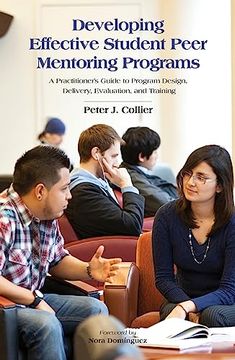Synopsis "Developing Effective Student Peer Mentoring Programs (in English)"
At a time when college completion is a major issue, and there is particular concern about the retention of underserved student populations, peer mentoring programs offer one solution to promoting student success. This is a comprehensive resource for creating, refining and sustaining effective student peer mentoring programs. While providing a blueprint for successfully designing programs for a wide range of audiences - from freshmen to doctoral students - it also offers specific guidance on developing programs targeting three large groups of under-served students: first-generation students, international students and student veterans.This guidebook is divided into two main sections. The opening section begins by reviewing the issue of degree non-completion, as well as college adjustment challenges that all students and those in each of the targeted groups face. Subsequent chapters in section one explore models of traditional and non-traditional student transition, persistence and belonging, address what peer mentoring can realistically achieve, and present a rubric for categorizing college student peer-mentoring programs. The final chapter in section one provides a detailed framework for assessing students' adjustment issues to determine which ones peer mentoring programs can appropriately address. Section two of the guidebook shifts from the theoretical to the practical by covering the nuts and bolts of developing a college student peer-mentoring program. The initial chapter in section two covers a range of design issues including establishing a program timeline, developing a budget, securing funding, getting commitments from stakeholders, hiring staff, recruiting mentors and mentees, and developing policies and procedures. Subsequent chapters analyze the strengths and limitations of different program delivery options, from paired and group face-to-face mentoring to their e-mentoring equivalents; offer guidance on the creation of program content and resources for mentors and mentees, and provide mentor training exercises and curricular guidelines. Section two concludes by outlining processes for evaluating programs, including setting goals, collecting appropriate data, and methods of analysis; and by offering advice on sustaining and institutionalizing programs. Each chapter opens with a case study illustrating its principal points. This book is primarily intended as a resource for student affairs professionals and program coordinators who are developing new peer-mentoring programs or considering refining existing ones. It may also serve as a text in courses designed to train future peer mentors and leaders.

